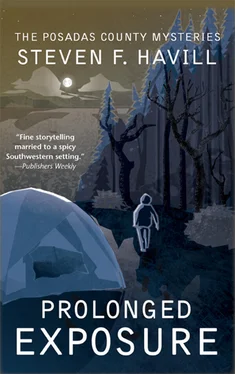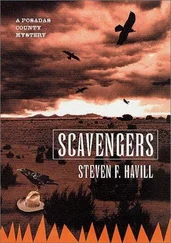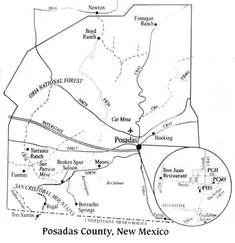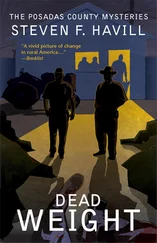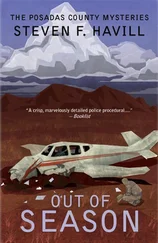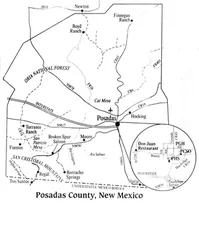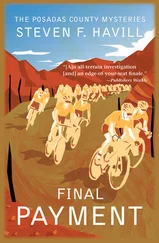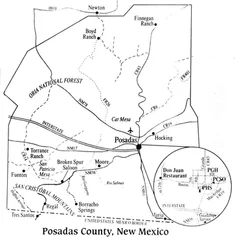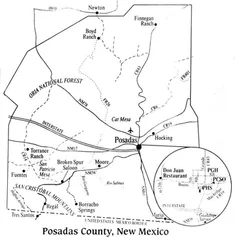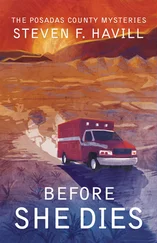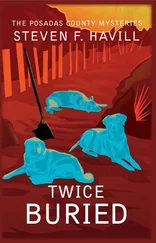Steven Havill - Prolonged Exposure
Здесь есть возможность читать онлайн «Steven Havill - Prolonged Exposure» весь текст электронной книги совершенно бесплатно (целиком полную версию без сокращений). В некоторых случаях можно слушать аудио, скачать через торрент в формате fb2 и присутствует краткое содержание. Год выпуска: 2011, ISBN: 2011, Издательство: Poisoned Pen Press, Жанр: Полицейский детектив, на английском языке. Описание произведения, (предисловие) а так же отзывы посетителей доступны на портале библиотеки ЛибКат.
- Название:Prolonged Exposure
- Автор:
- Издательство:Poisoned Pen Press
- Жанр:
- Год:2011
- ISBN:978-1-61552-231-1
- Рейтинг книги:3 / 5. Голосов: 1
-
Избранное:Добавить в избранное
- Отзывы:
-
Ваша оценка:
- 60
- 1
- 2
- 3
- 4
- 5
Prolonged Exposure: краткое содержание, описание и аннотация
Предлагаем к чтению аннотацию, описание, краткое содержание или предисловие (зависит от того, что написал сам автор книги «Prolonged Exposure»). Если вы не нашли необходимую информацию о книге — напишите в комментариях, мы постараемся отыскать её.
Prolonged Exposure — читать онлайн бесплатно полную книгу (весь текст) целиком
Ниже представлен текст книги, разбитый по страницам. Система сохранения места последней прочитанной страницы, позволяет с удобством читать онлайн бесплатно книгу «Prolonged Exposure», без необходимости каждый раз заново искать на чём Вы остановились. Поставьте закладку, и сможете в любой момент перейти на страницу, на которой закончили чтение.
Интервал:
Закладка:
Steven F. Havill
Prolonged Exposure
Chapter 1
The late-afternoon sun angled across the sweep of the bunchgrass prairie, casting harsh shadows around mesas and on the lowlands where arroyos cut the sand into fantastic patterns. The wind gusted fitfully, as if nervous about the clouds forming over the San Cristobal Mountains to the south, along the Mexican border.
With my eyes closed, I could watch the changing patterns of shape, color, and texture. I could even see where an aging pinon clung in the loose, powdery soil on a distant rock outcropping, and I could see, in the shade under that pinon, a Saye’s ground squirrel industriously sifting through the pinon-nut hulls for one that held a morsel.
The image was strong enough that I could smell the prairie, and hear it, and even, sitting there quietly in my chair, imagine that I could feel the ghostings of fine sand particles across my bare feet.
The landscape would hold as long as I kept my eyes closed. If I opened them, I’d see the hedgerow that marked the back property line of my daughter’s home. And beyond that, if I cared to get up and stroll across a quarter acre of manicured bluegrass, I would catch a glimpse of power lines and rooftops, an expanse of suburbia that stretched, as far as I knew, all the way east to Lake Huron.
I had been sitting with a paperback novel open on my lap, head leaned back, eyes closed, soaking in the Michigan haze. The novel wasn’t worth reading, but it was good for appearances. Otherwise, I sure as hell would have looked like an invalid. I’d lost a few pounds-I had plenty to spare still, but decent green-chili burritos were difficult to find in central Michigan, and I woke up each morning with the feeling that I was fading fast.
Were I recuperating in New Mexico, where I belonged, the lack of proper food could have been offset by doses of sunshine strong enough to bake lizards. But that wasn’t the case, either. If the sun had been lit at all in Michigan that day, it was hidden somewhere behind a sky of flat, featureless stainless steel. So, with my eyes closed, I pretended.
My daughter Camille would have only chuckled if I complained, so I didn’t bother. Her one concession during the past three weeks had been letting me keep the wheelchair longer than necessary, but even its usefulness was fading. The gadget would have been even more comfy with a nice knitted afghan to spread across my lap, but my daughter would never have allowed that. She was into power recuperation.
I didn’t need the wheelchair, mind you. I took long morning and evening walks, sometimes in the company of one or more of my teenaged grandchildren, strolling around blocks of secluded, expensive homes with smooth black macadam driveways. There were no rattlesnakes, no goatheads to pick out of my socks later, no sand. I hated every step.
And for the past week, Camille had been making noises about sending the wheelchair back to the health-aids rental place from which it had come, but I had pointed out that of all the furniture on my daughter’s patio, the straight-backed aluminum speedster was the most comfortable. If I had slipped into one of the low Adirondack chairs, I never would have been able to heave my bulk up and out. The other choice was even more unattractive. The white wicker love seat had enough sharp cane ends sticking out that no matter which way I sat, some article of clothing was speared.
Behind me, I heard the back door open.
“Do you want to take a call from the sheriff’s office?” Camille possessed one of those voices that carried command in every sentence. If she had said, “It’s a beautiful day,” well then, by God, it had better just be a beautiful day, if it knew what was good for it. She was the oldest of my four children, and she had been boss since she was two years old.
“Why do they want to talk to me?” I asked, turning my head so I could see her. She shrugged, and waggled the receiver at me. She was wearing an apron, which meant that she was cooking something that would end up resembling health food. I frowned. “I don’t even know what county we’re in,” I added.
I had a fleeting vision of the local police hopelessly stymied by a tough case. They knew that their only hope lay with the aging, ailing undersheriff, who happened to be in town visiting relatives and recuperating from having his carotid arteries reamed out. I could see the harried captain of detectives reaching for the phone, saying with arched eyebrow to his sweating lieutenant, “Let’s call Gastner in.” It was indeed a fleeting vision, the sort of thing the mind dreams up when there’s too much free time.
“This is Genesee County,” Camille said, “but you’re off by about two thousand miles.” She grinned, her dark face softening until she looked like her mother. “The acting undersheriff wants to speak with you.” She put the receiver to her ear and said, “He hasn’t decided whether or not to get out of his chair, Estelle. Hang on a minute while I beat on him.”
My pulse jumped, not from the threat of pummeling, but from the mention of Estelle Reyes-Guzman’s name. Camille saw the expression on my face. “The cord won’t reach,” she said, but I was already grunting myself upright.
“They make cordless phones now,” I muttered, but I knew that on her husband’s lowly earnings as an oral surgeon, they no doubt had to be careful about such luxuries.
Out of habit, I glanced at my watch and saw that it was 4:36. Flint, Michigan, was on eastern time, so it was siesta time in Posadas County, New Mexico. If I’d been home, I would have been just wrapping up lunch at the Don Juan de Onate restaurant. But I wasn’t home.
Camille handed me the phone as I reached the screen door.
“Gastner,” I said, sounding for all the world as if I’d been busy with something important.
Estelle Reyes-Guzman knew better, even from two thousand miles away. “I hope I didn’t wake you, sir,” she said.
Her voice was soft and musical. I grinned and ambled back toward the kitchen, doing my best not to trip over the cord. “I was right in the middle of a high-level meeting,” I said. “It’s good to hear from you.”
Estelle, chief of detectives for the Posadas County Sheriff’s Department, had called several times during my convalescence, and I’d called her only two days before, enjoying a nice long chat at my son-in-law’s expense. He didn’t mind, and he even pointed out that what few calls I made were nothing compared to the communications havoc that his three teenagers could wreak.
In the background, I heard the squelch of the dispatcher’s radio. Knowing that Estelle was at the office peaked my interest, and it was logical that she hadn’t called just to chat.
“What’s up?” I asked.
“There were a couple of things Francis wanted me to ask you, and now I can’t remember what they were,” Estelle said.
Her physician husband could ask his own questions, and no doubt would when next we met eye-to-eye. “Tell him that I’ve lost a hundred pounds and that I’m running eight miles every morning. And that I’ve given up Mexican food entirely.”
“The latter I can believe, sir,” she said, “As long as you’re stuck up there.”
“Ain’t that the truth.”
“I called because of a couple of things myself,” she said. “First of all, do you remember Florencio Apodaca?”
I should have responded, “Well, sure, of course I do,” but the name drew a blank. “Uh-huh,” I said instead, a grunt that could be construed either way.
“Mr. Apodaca is the old man who lives at the end of Escondido Lane, in that old adobe with the steep metal roof and-”
I interrupted her as my memory kicked into gear. “Sure,” I said. “Of course.” Escondido Lane curved around behind my own property in Posadas. If my five acres hadn’t been so choked with trees and brush, I could have looked out my den window and seen the Apodacas’ house three hundred yards away.
Читать дальшеИнтервал:
Закладка:
Похожие книги на «Prolonged Exposure»
Представляем Вашему вниманию похожие книги на «Prolonged Exposure» списком для выбора. Мы отобрали схожую по названию и смыслу литературу в надежде предоставить читателям больше вариантов отыскать новые, интересные, ещё непрочитанные произведения.
Обсуждение, отзывы о книге «Prolonged Exposure» и просто собственные мнения читателей. Оставьте ваши комментарии, напишите, что Вы думаете о произведении, его смысле или главных героях. Укажите что конкретно понравилось, а что нет, и почему Вы так считаете.
